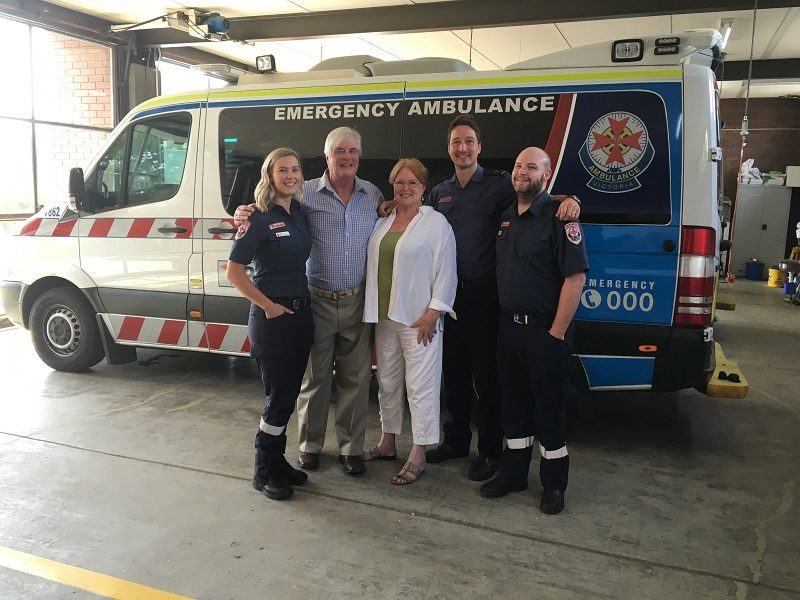Riddells Creek grandfather thanks wife and paramedics
March 15, 2017in Community News
A Riddells Creek man who suffered a cardiac arrest at his home was reunited with the Advanced Life Support (ALS) paramedics
and the Mobile Intensive Care Ambulance (MICA) paramedics who helped him in September.
Grandfather-of-two Tom Woodlock was asleep when he made a loud noise that woke his wife of almost 45 years, Sandra.
‘I don’t remember anything leading up to the day I had my cardiac arrest but I know I hadn’t been feeling unwell in any way,’ To m, 70, said.
m, 70, said.
Sandra said she woke to a gasping noise and immediately knew something wasn’t right.
‘When I woke to such a loud sound, I looked at Tom to check if he was OK – and then I immediately called Triple Zero (000) and put the call-taker on loudspeaker,’ Sandra said.
Sandra followed the call-taker’s instructions and moved Tom on to the floor before commencing Cardiopulmonary Resuscitation (CPR).
‘While I was on the phone to the call-taker and doing the compressions, Tom was starting to turn blue and I said to the call-taker, ‘I think I’m losing him,’ – that’s when then the paramedics arrived and took over.’
ALS paramedics Samantha McDonald and Tim Britten were first on scene.
‘We walked in to Sandra being understandably quite distressed after doing CPR on her husband,’ Samantha said.
‘Given the circumstances, Sandra did a great job with CPR.’
Samantha said she and Tim took over CPR and began monitoring Tom.
‘Tom was in cardiac arrest. We attached a defibrillator and shocked him several times,’ she said.
A defibrillator is used to analyse a person’s heart rhythm and shock a person’s heart back into normal function if they are in cardiac arrest.
The MICA crew then arrived to assist with treating Tom.
MICA paramedic Nathan Grimshaw said that CPR was in progress when he arrived and he saw that the crew’s defibrillator had been applied.
‘The ALS ambulance crew that was already on scene were doing a fantastic job and were absolutely instrumental in saving Tom’s life,’ Nathan said.
‘My partner and I added to their management, continued CPR, used the defibrillator and we also administered other medications to treat Tom. We then intubated Tom, which is where a breathing tube is inserted to help a patient to breathe.’
Trevor Weston, Ambulance Victoria Manager Emergency Co-Responder Programs, said that early CPR and defibrillation were key links in the ‘chain of survival’ – a process which can help save the lives of people in sudden cardiac arrest.
‘The six steps in the ‘chain of survival’ are: early recognition of cardiac arrest, early access to emergency care (calling Triple Zero), early CPR, early defibrillation, early advanced care (paramedics) and definitive care (hospital),’ Trevor said.
Tom spent a month in hospital, including two weeks in intensive care. He is recovering at home after having a defibrillator fitted.
Samantha said she was ecstatic when she heard Tom had survived.
‘After seeing Sandra on the night of her husband’s arrest, I was really hoping for the best for her and her family, so I was pleased to hear Tom was OK,’ she said.
Nathan said he was amazed when he heard Tom was recovering and was back to doing usual and normal things like mowing the lawn.
‘I couldn’t wait to meet Tom and Sandra – it’s one of the most rewarding things in my career to see someone you have previously treated,’ he said.
Sandra and Tom said they couldn’t thank the paramedics enough for what they did – both for Tom and their family.
Apart from suffering some memory loss as a result of his arrest, Tom is recovering well and was back to playing lawn bowls soon after being discharged from hospital.
Tom said his wife did a fantastic job before the paramedics arrived and that the paramedics who treated him when he fell unwell were wonderful.
‘Without the help of the paramedics on that day, I wouldn’t be here today,’ Tom said.
‘It was so great to meet them – I don’t remember them from my cardiac arrest so it’s nice to see the people who helped me along.’ Sandra echoed similar thoughts.
‘I cannot explain how grateful Tom and I are to the paramedics for making sure Tom is still with us,’ Sandra said.
‘They didn’t just save Tom’s life, they also saved my life and the lives of our sons by making sure Tom is still here with us today – paramedics are magnificent and kind people – they are absolute heroes.’
You can learn more about CPR at www.ambulance.vic.gov.au/cpr
